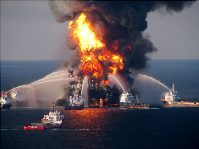US reiterates tough stance against BP on Gulf spill
By ANGEL GONZALEZ and TOM FOWLER
HOUSTON -- The US Department of Justice said it intends to prove that BP committed gross negligence or willful misconduct in the events leading to the Deepwater Horizon oil spill, reiterating its previously-stated stance against the UK oil giant.
 The statement, in a memo filed with a New Orleans federal court last Friday, put pressure on BP shares Wednesday after being reported by the Financial Times, a sign of the lingering risk the 2010 disaster still poses to the company.
The statement, in a memo filed with a New Orleans federal court last Friday, put pressure on BP shares Wednesday after being reported by the Financial Times, a sign of the lingering risk the 2010 disaster still poses to the company.
But some analysts stressed that it said nothing new. “Recent headlines appear to be ‘much ado about nothing’,” said Thomas Claps, an analyst with Susquehanna Financial Group.
“The DOJ has always claimed that BP and other parties were grossly negligent, and that it would be seeking maximum penalties, so these statements should come as no surprise to investors,” Mr. Claps said.
In the filing, made in response to a previous BP request to accept a $7.8 billion settlement between the company and thousands of plaintiffs over economic losses and property damage, the Department of Justice said that BP had a culture of recklessness, and also pointed the finger to Transocean, the offshore contractor that owned the Deepwater Horizon rig leased by BP.
BP’s “gross negligence and willful misconduct are inextricably joined with the acts and omissions of Transocean,” the government said.
In April 2010, a blow-out at the well drilled by the Deepwater Horizon rig killed 11 and unleashed the worst offshore spill in US history.
The government, however, did not oppose the settlement between BP and the plaintiffs.
BP said in a statement that the government “made clear that it does not oppose the settlement,” and that “other issues raised by the government simply illustrate that disputes about underlying facts remain. BP believes it was not grossly negligent and looks forward to presenting evidence on this issue at trial in January.”
Transocean didn't immediately respond to a request for comment.
Analysts with Tudor, Pickering, Holt & Co. said that the feisty tone in the latest government’s broadside could mean that a settlement is less likely than previously thought, and “court hearings could last years.”
David Pursell, a managing director at Tudor, noted the absence of Halliburton in the government filings, and took that as further indication that the energy-services firm was unlikely to face civil penalties for its role as the cement contractor on the well.
“From a markets standpoint it's important because there had been this overhang for Halliburton,” Mr. Pursell said. The company didn't immediately respond to a request for comment.
The U.S government is seeking civil penalties under the Clean Water Act that could total billions of dollars.
The law allows the government to collect between $1,100 and $4,300 for every barrel of oil that spilled, depending on whether the company is found to have acted with negligence. A government-led group estimates that 4.9 million bbl of oil spilled into the Gulf.
Tudor, Pickering, Holt & Co. analysts say that if gross negligence is proven, fines could amount to $18 billion, versus just $5 billion if BP is found to be “just negligent.”
Dow Jones Newswires






Comments